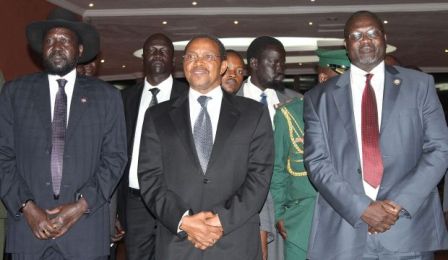S. Sudan rebels deny endorsing Kiir’s party leadership
October 22, 2014 (ARUSHA) – The armed opposition faction of the Sudan People’s Liberation Movement has dismissed allegations suggesting the recently signed framework agreement in Arusha, Tanzania, had endorsed reuniting the three SPLM factions under the leadership of president Salva Kiir.

On Monday the SPLM in government, SPLM in opposition and SPLM of 10 former detainees signed a roadmap agreement under the auspices of the Tanzanian ruling party, the Chama Cha Mapinduzi (CCM), which shall guide further negotiations in an attempt to reunite the bitterly divided historical movement.
The document was signed on Monday in the Tanzanian northern town of Arusha and witnessed by the two principal rival leaders, namely president Salva Kiir, who chairs the SPLM in government and Riek Machar, former vice president and leader of the SPLM-in-Opposition.
SPLM of former detainees also participated in the talks and inked the document as well.
President Jakaya Kikwete who chairs the Tanzanian ruling party, the Chama Cha Mapinduzi (CCM), facilitated the intra-SPLM dialogue, also witnessed the signing ceremony.
The agreement attracted mixed reactions in the social media with many suggesting that the SPLM factions had endorsed Kiir, who chairs the ruling party, as the future chair of a unified SPLM.
However, spokesperson of the opposition leader Riek Machar said the allegations were a misrepresentation of what transpired in Arusha.
“This is not true. It is a misrepresentation of what transpired in Arusha. The framework document has not endorsed any leadership. Actually the agreement has not yet addressed future leadership. It has only outlined guiding principles and set an agenda for future negotiations,” Machar’s spokesperson James Gatdet Dak told Sudan Tribune on Tuesday.
Dak said substantial issues are yet to be discussed by the three factions, which he said will include SPLM self-assessment and evaluation that will also look into political, organisational and leadership issues.
He added that the ruling party factions will also discuss how to reconcile and heal the party as well as come up with implementation mechanisms.
“We are not yet there. The future of leadership will be discussed in the subsequent agendas which will encompass political and organisational issues,” he added, saying the framework agreement was simply to launch the process and was not a final agreement.
“A possibility of whether Salva Kiir shall maintain or relinquish the party leadership will be dealt with in the next phases,” he said.
However, Dak added that president Kiir’s ruling party for the first time agreed to address the root causes of the 15 December crisis, which he said they were previously reluctant to address despite calls by the SPLM-in-Opposition.
He also said the SPLM in government acknowledged that the crisis emanated from within the SPLM leadership and therefore was not a military coup attempt as they previously alleged.
Dak explained that should the divided party address the root causes of the conflict and agree on the way forward including resolving on future party leadership, this could enforce the Addis Ababa peace talks.
The SPLM, he further explained, has had difficulties whenever it came to introducing political reforms, saying this had occurred in 1983, 1991, 2004 and now 2013, adding that there is a possibility the party might have learned again the hard way and reunite.
The Arusha document recommits the parties to the principles of democracy, internal democracy especially on matters of decision making, elections, succession and peaceful transfer of power.
It also calls for “unity of SPLM as a safeguard against fragmentation of the country along ethnic and regional fault lines”.
The framework agreement has recognised the need to “revitalise, reorganise, strengthen and restore the SPLM to its vision, principles, political direction and core values and initiate measures to stop the war, lead the government and the people of South Sudan towards peace, stability and prosperity”.
Both leaders expressed their commitment to the intra-party dialogue that would reunite the divided historical party.
REBELS COMMIT TO IGAD-LED PROCESS
The rebel leader’s spokesman also added that the intra-SPLM dialogue is however not a replacement of the ongoing peace talks in Addis Ababa which is mediated by the Intergovernmental Authority on Development (IGAD).
Dak said the SPLM-in-Opposition and its leadership was committed to the IGAD-led peace process to end the more than 10-month-long conflict.
President Kiir in his speech in Arusha on Monday during the signing of the framework agreement however accused IGAD of failure in the peace process.
He described the IGAD mediation as simply for “record purposes” and not for a solution.
“IGAD has failed. We are doing it for record purposes not that something will be done,” he said.
(ST)
